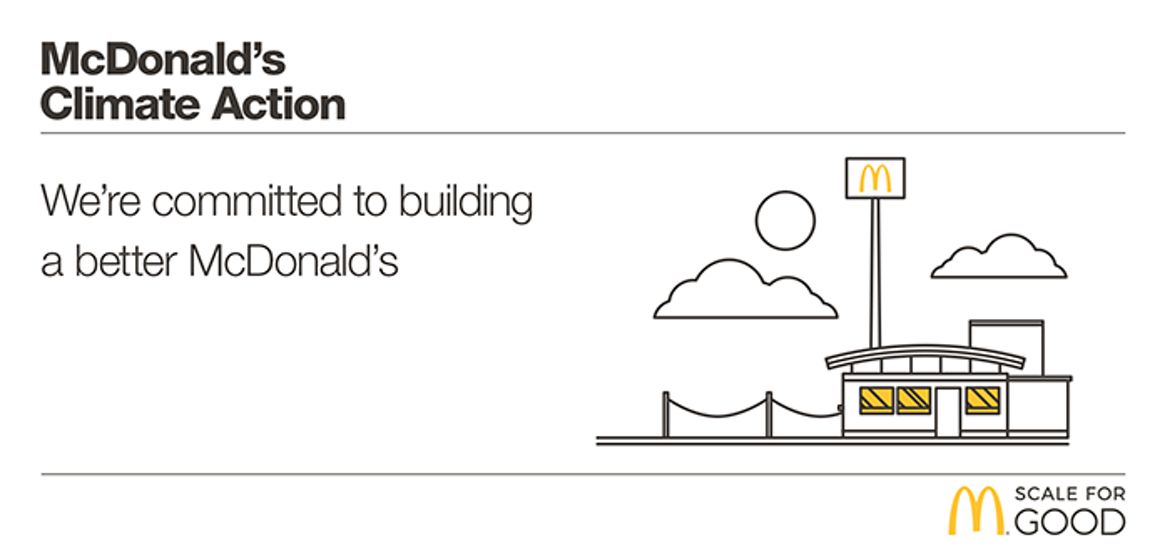Using Our Scale for Good: Taking Big Steps to Reduce Our Carbon Footprint
March 20, 2018
By Robert Gibbs, Global Chief Communications Officer
It’s unmistakable. Climate change is the greatest environmental issue of our time, but what can a burger company do about it? The answer may surprise you.
At McDonald’s we have a responsibility to do our part to address climate change. To create a better future for our planet and help reduce the effects of climate change, we must all get involved.
Today, McDonald’s becomes the first restaurant company in the world to address global climate change by setting a Science Based Target to significantly reduce our greenhouse gas emissions. When you operate 37,000 restaurants in 120 markets around the world, serving 69 million people each day, every change makes a big difference.
To reach this target, we will partner with franchisees and suppliers to reduce greenhouse gas emissions related to McDonald’s restaurants and offices by 36 percent by 2030 from a 2015 base year. Additionally, McDonald’s commits to a 31 percent reduction in emissions intensity (per metric ton of food and packaging) across its supply chain by 2030 from 2015 levels. This combined target has been approved by the Science Based Targets initiative (SBTi).
Through these actions, we expect to prevent 150 million metric tons of greenhouse gas emissions from being released into the atmosphere by 2030.
Preventing 150 million metric tons of C02e is the equivalent of:
- Taking 32 million passenger cars off of the roads for an entire year
- Planting 3.8 billion trees and growing them for ten years
- Nearly the carbon footprint of Belgium, Vietnam or the Czech Republic
We are using our scale for good to take action on climate change because it affects our customers, employees and everything from our supply chain to the thousands of communities around the world in which we operate.
In collaboration with franchisees, suppliers and producers, McDonald’s will prioritize action on the largest segments of our carbon footprint: beef production, restaurant energy usage and sourcing, packaging and waste. These segments combined, account for approximately 64 percent of McDonald’s global emissions.
While we have made progress in our restaurants and supply chain, with our new target we are taking bigger and bolder actions to lessen our impact moving forward.
Together with our franchisees, we will continue to tackle restaurant energy usage and sourcing through innovations and programs to promote energy efficiency and renewable energy. This includes equipment and building design innovation, energy monitoring, and crew training programs which could provide long-term cost savings. In the U.S., our work with sustainable design groups has already created a 16.7 percent reduction in electricity use in restaurants built since 2015, and we’re working with groups like the Renewable Energy Buyers Alliance and other partners to make renewable energy purchasing more affordable and practical for our franchisees in their local communities.
We will work with the suppliers who provide the food, packaging and materials to McDonald’s restaurants to identify meaningful opportunities to reduce emissions across their supply chains, prioritizing areas that represent the largest segments of our emissions. For example, we will continue to partner with beef producers, industry leaders and the people that work the land and manage resources every day to support sustainable practices in farming, grazing and conservation. Through these innovations, together we will drive demand and invest more in programs that pioneer ways to produce our food without increasing greenhouse gas emissions.
These examples are just the beginning of our efforts, but testament to how we will use our scale for good as we drive investment in such programs, convene with partners who share our vision to take action and increasingly take significant steps to combat climate change. Our company has a responsibility and opportunity to help lead the way toward better and more sustainable industry practices.
It’s all part of building a better McDonald’s.

